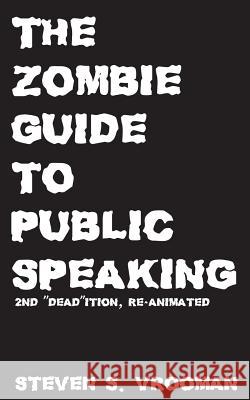The Zombie Guide to Public Speaking: 2nd "Dead"ition » książka
The Zombie Guide to Public Speaking: 2nd "Dead"ition
ISBN-13: 9781515337799 / Angielski / Miękka / 2015 / 346 str.
The Zombie Guide to Public Speaking: 2nd "Dead"ition
ISBN-13: 9781515337799 / Angielski / Miękka / 2015 / 346 str.
(netto: 73,32 VAT: 5%)
Najniższa cena z 30 dni: 72,87 zł
ok. 13-18 dni roboczych.
Darmowa dostawa!
If this book were just a satire, it would grow old pretty quickly: 1.Stumble to the front. 2.Raise your arms. 3.Groooooaaaannnnn. Instead, this book is a deeply researched investigation into why most public speeches don't really accomplish our goals and what we can do about that. As I was writing it, perhaps because I teach popular culture as well as public speaking, I became somewhat obsessed with the ways that the scary, brainless interaction that passes for speaking is so similar to the scary, brainless zombies in popular culture. You shamble up to the front of the room. The audience groans and shuffles around. Everyone is looking for brains. There are none to be found. All suffer from the living death of boredom and lack of engagement. One of the scary things about zombies is that they look like people, your neighbors, family, colleagues and friends, but they are not. At least one person in most zombie movies will make the mistake of thinking there is still humanity in there and they get chomped for it. This is also what is scary and sad about most speeches. Everyone looks human. But there are no human connections. Our minds disappear into a glaze of Power Point. In most places where we give speeches, we do the same thing. We brainlessly show up to the same places, go through the same motions, use the same kinds of slides, and repeat the things that seem to matter even when they don't. All too often we show up to meetings or events or class, pretending that we are doing a lot of work. And we want our audiences to believe it too. And when they clap and we sit down, for a minute all of us feel that it was all right, that we really did all just endure something together that was worth it. A second later, that feeling is gone, and we wonder what happened to another day or another afternoon and wish, like we did when we were ten, that somehow school would be cancelled and we could, just for a day, choose again to do something cool with our time. Most speeches fail. We pretend that this is okay, that it is not a terrible waste of everyone's time. We go through the motions again like zombies. This book will try to drill down to get to what is most important and what can actually make you better. The argument is simple: you are doing it wrong. Public speaking, at its best, moves people and creates change. But when was the last time you were enthralled by a speech? No phone, no wandering attention, no thoughts of lunch? Speaking has become an inert show, a droning on in front of a flickering failure of visual aids. We have already given up before we stand up to give a speech. No one cares, not even you. Public life has been reduced to a "let's just get this over with" mentality. Too strong a judgment? Look at the faces in the room around you next time you are sitting in an audience and tell me I'm wrong. We need to resurrect this dead thing called speaking. This book has two new chapters. Seven chapters have been extensively altered. All of this, from the first-ever public speaking textbook chapter on depression to the extensive use of Dungeons & Dragons references in the figurative language chapter, is designed to make the book more interesting and useful than the first edition was. Don't get me wrong. I loved the first edition of this book. It was the best thing I'd ever written. But, it needed to be better.











